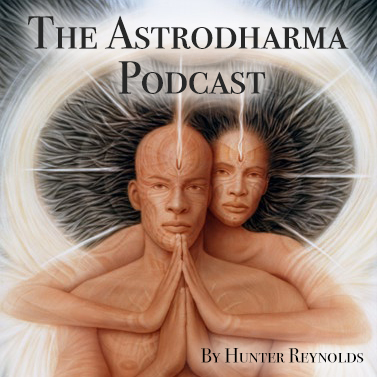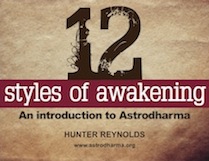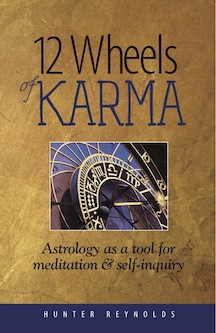
THE SKY THAT’S HOSTING US:
Healing our relationship to space and recovering our timeless buoyancy
WELCOME to the Astrodharma Podcast. My name is Hunter Reynolds and I invite you to join me as we sip the tea of self-inquiry, sit proud in our infinity and bask in the soul-seeing light of modern, meditative astrology.
This episode contains five dharma bell breaks and ends with three minutes of devotional chanting.
If you’d like to learn more about my online readings and mentorships, please visit my website: astrodharma.org.
Modern meditative astrology turns people into vampires, sucking presence from personhood, deathless Being from archetype slaves. Those generic horoscope columns: archetypal fast food, pumping people full of Presence-killing preconceptions and “food for the mind.”
Nothing against horoscopes, mind you. We’ve simply forgotten what they are.
The word, “horoscope” is derived from the Greek word, horoskopos, which means “time observer.” Sounds like a good idea. But to observe something you must view it from a space that both includes and transcends it. Only the timeless part of us has enough distance from time to contemplate it as a separate phenomenon. Suddenly, “horoscope,” is interchangeable with “awareness” or “true nature!” Who knew!
Astrology is the science of archetypal smoke. It points at the dream we’re here to wake up inside of. It pushes us to mercifully witness our karmically inherited me-stories and meditatively manage them.
In this way we applaud the passing clouds of mind, whilst grounding ourselves in the Merciful Witness. We assume our true position as the sky that’s hosting this wispy play of personhood.
Every wonder why there’s so much sky, and so little “us?”
The answer comes quickly, with a little on-the-spot self-inquiry. The next time you savor a blazing sunrise, notice what is happening. You are moving awareness off of people and things and onto atmospheres: the same sort of soft, field-sensing focus we need to meditatively assess our inner atmosphere.
That’s right: sky watching is foreplay for mind watching.
—–Dharma Bell Break #1
What happens when souls deprive themselves of sky’s meditative “running start?” Look around. Isolation, depression and a restlessly claustrophobic sense of self.
Therapists and priests can help- but only so much. Why? Because a tiny existential cancer (ego) was left untreated by the chemo of boundless wonder. The miracle cure: trips to the nearest soccer field at dawn.
The important thing is to get outside. The tree that the Buddha woke up under supplied him with a vibrationally alive vantage point. Dead space turned into something wildly ethereal.
The Society of Meat Sacks
When we walk the world as awareness itself, communing with space as “a Psyche of cosmic dimensions,” we walk unseduced by honor, reputation and gain. Sure, we still strive for bodily health and longevity- but not so much to postpone death as to stick around long enough to help as many souls as possible awaken from ego’s painfully orphaned habits of mind so they can survey the dysfunctional dreamscape with sublimity, ease and eternity-with-eyes.
When we walk the world as a me-story-riddled “meat sack,” on the other hand, we reflexively like and dislike other meat sacks and define ourself according to our status in the society of meat sacks. At every turn, we will speak and act in ways that make us feel solid, separate and real- unswallowed by this mouth of the void, forever poised to swallow our tiny dot of flesh.
Minus a practice of savoring inner and outer atmospheres, we become compulsive identity-grabbers, subconsciously waring against the enemy of absolute disappearance.
The difference between those who feel cosmic and those who feel claustrophobic hinges on how they perceive the sky that’s hosting them. Need a meditation mentor? Father sky is standing by, ready to help.
Awareness, itself, is relaxed and storyless. It sees sky for what it is: a Seamless field of sentience. The meat sack, on the other hand, sees sky as an ominous pixellator of identity.
Given that so much of our human experience depends on how we perceive inner and outer space, it behooves us to become familiar with the philosophy of space.
But first let’s take a glance at the sky’s stats.
124 miles above us– extending, as best we know, to eternity — is a dark, soundless vacuum whose temperatures hover between 233-454 degrees below zero. Meanwhile, down here earth, a more temperate layer of this mind-killing abyss flushes through us like water through the gills of a fish.
Still, we fall down to the god of form!
—-Dharma Bell Break #2
Questions arise:
Does its transparent quality alone account for how seamlessly we fail to contemplate space?
Is there a connection between how we move through outer space and how we inhabit inner space?
Can we come into right relationship with people, places and things if we are numb to the milieu in which they float?
And finally, could “enlightenment” be code for “space-sensitive?”
The Sky Signs
For answers to these questions, it makes sense to turn to the three sky signs: Gemini, Libra and Aquarius.
As a medium through which to move, explore and connect through verbal communication, space correlates with the Gemini archetype. Language, after all, is simply vibrated air.
As we bridge space more intimately through one-to-one relationships, we access Libra. Libra fires the synapse of space with love.
Experiencing a wider, Aquarian sense of community throws an even broader net over space. Aquarius treats individuals as emissaries of the larger collective Consciousness.
Each sky signs has its own unique style of closing the gap.
Too spacey to keep your appointment with space? Hang around the sky signs.
—-Dharma Bell Break #3
Before we go any further into this correlation between archetype and emptiness, it’s important to understand why space got shoved, so brutally, into the perceptual back seat. It was not always so.
Sky Gazing
The Greeks believed that when we die we return to the star we came from — thus their avid interest in astrology. For them, staring into the sky was like leafing through the family photo album. Astrology was nostalgia.
The ancient meditative practice of “sky-gazing” (also called “space-mingling”) is most commonly ascribed to the Dzogchen branch of Tibetan Buddhism. In truth, however, this intimate encounter with the sky that’s hosting us is common to all contemplative faiths and cultures.
Perhaps the most secularizing impact of early childhood education is its insistence on shifting the naturally diffuse, infant eye away from “negative” space into a more form-fixated state. Putting aside whether this is an indispensable part of psychosocial integration and bodily survival or an institutionalized denial of oneness, it is clear that whether we’re abiding as inner sky or mingling with the outer one, sky-gazing is a broadly accepted meditation practice.
It isn’t hard to understand what motivates these cross-cultural meditations on the void. Failing to cultivate a conscious relationship with space, how can we ever hope to know the nature of what moves through it? Is not encountering the nature of the sky that hosts us at least half of any honest existential inquiry?
And so arises the philosophy a space: a bona fide academic study and school of thought.
The Philosophy of Space
Disagreement continues between philosophers over whether space is a separate thing, an interconnecting medium between things, or a fundamental aspect of our consciousness (ie. “us!”) The following is a summary of the three basic approaches to the philosophy of space:
- Space as self-existing phenomenon.
In Isaac Newton’s view, space exists permanently and independently of matter and its nature is uninfluenced by whether or not there is any matter in the space.
- Space as interpenetrated with form.
Gotfried Leibniz thought of space as a collection of relations between objects. In the same way that one must — in order to understand a human family — take into account both the nature of the individuals and the relationships between them, so, too, one cannot accurately comprehend space apart from objects. In other words, space could not exist independent from objects because that implies a difference between two universes (space and form), that are exactly alike except for their location.
- Space as Consciousness.
Emmanuel Kant saw space as both self-existent phenomenon and as a web of relations. Instead of being an objective feature of the outer world, space was considered the framework human beings use to structure and organize their experience. In this sense, space was seen as an interpenetrating feature of human consciousness.
By blurring the line between space and consciousness, Kant inspired God-friendly philosophers to take the natural next step. What is space? The medium of the One Being: God’s presence in the world.
Wow. If you’re anything like me, you’re wondering why all talk of space was omitted from your schooling. There must have been a good reason why inquiry into the nature of the cosmic stuff that presses so relentlessly against our skin was x-ed from the curriculum. Why is discussion and contemplation of space so taboo?
Meditators know.
—Dharma Bell Break #4
Something disturbing happens when we bring presence to transparency — when we “see ourself seeing” without care or concern for any solid object. We don’t just see through space, we see as space. Outlook and in-look blur. Suddenly, the ocean of invisibility that parts so graciously in front of us is seen for what it is: the phenomenological face of eternity — the awesome, ethereal substance from which all names and forms crawl forth and return.
To all-pervading awareness, this encountering of space as consciousness is a homecoming. To orphaned ego, however, it’s Kryptonite: a disorienting threat to the paradigm upon which we’ve built our life and relationships.
There. Now you know why mind so skillfully avoids space.
At any given moment, our true feelings about space can be discerned by how we breathe it. With each inhalation we are impaled by an infinitely extending nothingness that enlivens even as it mocks our puny proportions.
To consciously nurse on the breast of space, we also drink in the eons of time it would take to move through all of it. This sweet milk of spirit is, to ego, a bewildering chasm, endlessly echoing with life forms and lifetimes. To stat present to the mysterious cycles of breath is to watch the momentous concerns and dramas of our ego disappear like a fading contrail.
Ego doesn’t “forget” to breathe; the omission is a matter of pure survival.
Beneath its contrived, thumbs-up demeanor, personality knows that all times – good and bad – are milestones on the path back into the void: the selfless stuff we pretend so hard not to be strolling through.
While our now-drunk senses swoon in the jasmine-laced breeze, mind cringes at this cruel reminder of its passing ephemerality.
Why is meditation so disorienting? Because ego has to keep thinking, feeling and doing – manically parting inner and outer space – in order to feel like a solid, self-existent somebody. Minus movement, the unbounded sentience that we are, naturally returns to itself. Space returns to space!
The tearless malaise of the insincere practitioner
In a very real way, then, space – as a purely dimensional measurement – is our nemesis because it keeps us separate, alone and, for the majority of our lives, psychologically unknowable. To the extent that the gown of personality drapes thick, and our attention is turned away from the greater Beingness that unites us, space hurts.
Not even in the throes of deep meditation do we find complete relief from the sharp cut of space. Why? Because resting as undivided consciousness sensitizes us to the billions of orphaned egos out there who are, at this very moment, doing everything they can to harden their sense of self and and resist the inexorable undertow of no-thing.
Space tells us we are supernatural; and the supernatural will never be content “showered in the spit of pronounceable sound.”
This commonly denied, but subconsciously continual, attunement to the mankind’s collective predicament is, no doubt, what inspired the Buddha to teach that no soul can become fully awakened until all souls are. It also explains why flashes of enlightenment correlate with Uranus, ruler of the community-conscious air sign, Aquarius.
Spiritual egos like the idea of oneness- even heartbroken compassion- so long as this sensing into the larger field doesn’t involve getting endarkened by the billions battered by waves of meaningless suffering.
Welcome to the tearless malaise of the insincere practitioner.
—-Dharma Bell Break #5
Space as Kali
What is space? Ego knows. It’s Kali, the ego killer. Stare into her faceless face with any regularity and she’ll add you to her blessed belt of skulls. Fail to look, and she’ll send you running for the rest of your life until you grow so cynical with the false promise of form, you’ll take refuge in the stare of lesser Kali’s: addiction, workaholism and a scenery-devouring restlessness that earns you a lifetime membership in the the fellowship of weary witnessers.
How can we see through the concept of dead space to the field of pressed-together hearts and recover the timeless buoyancy of who we are? I will close with a few tips: again, from the “sky” signs, each of which has its own “invitation, inquiry and insight.”
Dharma of The Sky Signs
Awakened Gemini:
The invitation of awakened Gemini is simple: Graze wide fields of personality. Find the one taste. Gem nudges us to inquire: What are the Presence-arousing words that ventilate mind’s stuffy sense of “me-ness”? It’s final insight: Linger in the conversational pauses until silence grows a tongue – it’s wiser and more articulate than mind could ever be.
Awakened Libra:
Libra invites us into a new paradigm of caring: Don’t just love others. Let awareness fall hopelessly in love with itself. Libra asks: Are you bridging a perceived gap or realizing the One Being? It’s final insight: Clashing and caressing are equally inept forms of intimacy – minus the fragrance of the One Being.
Awakened Aquarius:
Aquarius invites us into the dance between personal and universal love, asking, What is the difference between equanimity and emotional numbness? It’s final insight: Community is a compressed field of egos and no form of human governance will work until the perception of “otherness” is, at least partially, meditated away.
One Freedom
To close this discussion on space, consider the possibility that, in the final analysis, we have only one freedom: to relate across space or AS space.
© Hunter Reynolds May 2023
Ready for more?
-Subscribe to The Astrodharma Podcast
–Learn about the Styles of Awakening online training
–Schedule an astrology reading with Hunter
–Subscribe to Styles of Awakening newsletter (monthly)
–Receive these articles by email as they are posted
Like this article? Please share it with friends.


 Get free newsletter & e-book
Get free newsletter & e-book